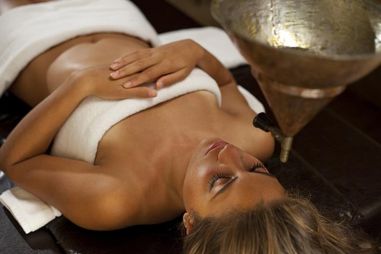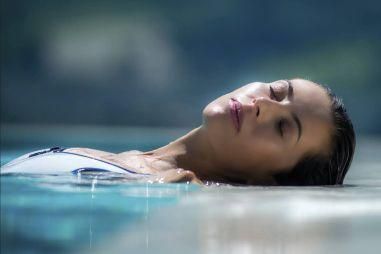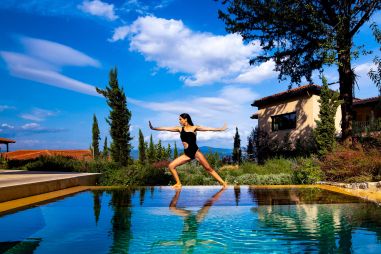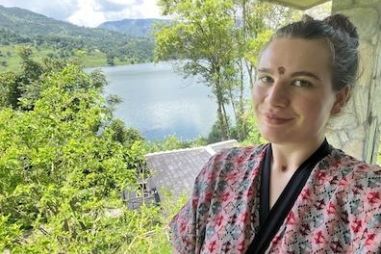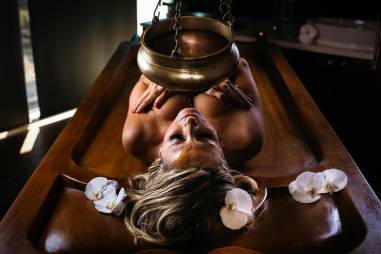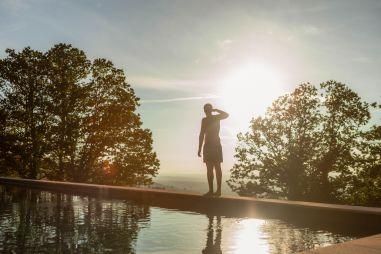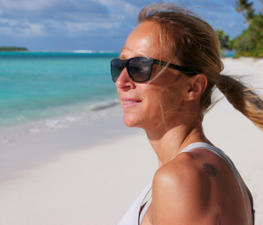Ayurveda A to Z – Your Complete Guide
Ayurveda, a natural system of medicine, originated in India more than 3,000 years ago. The word ‘Ayurveda’ is derived from the Sanskrit words ayur (life) and veda (knowledge). Thus, Ayurveda translates to knowledge of life. Ayurveda is based on the concept that health and wellbeing depend on a delicate balance between the mind, body and spirit. This Puurenkuur's beginners guide to Ayurveda is a complete guide to explain the various elements of an ayurveda program. Ayurveda is recognized as a complementary and alternative medicine system, and it is becoming increasingly popular as people seek out more natural and holistic approaches to healthcare. In Ayurvedic medicine, practitioners use a holistic approach to healing that includes a variety of techniques, including herbal remedies, dietary guidelines, massage, yoga and meditation. The goal of Ayurveda is to help you achieve optimal health by restoring balance to your physical and mental state.
- The meaning of Ayurveda
- Ayurvedic meals and food
- Ayurvedic Doshas
- Ayurvedic Dosha type Vata: Impulsive and enthusiasm
- Ayurvedic Dosha type Pitta: Fire
- Ayurvedic Dosha type Kapha: Structured
- 9x Ayurveda Treatments and massages
- Herbal Ayurvedic Medicine
- Yoga as powerful element to the Ayurvedic treatments
- Meditation as mindful element to the Ayurvedic treatments
- Effects on emotional and physical health
- 14x tips for your Ayurveda retreat
- Discover our Ayurveda holidays
- Panchakarma retreats
- Ayurveda retreats in Europe
- Short Ayurveda Boosters
- Authentic Ayurveda retreats in India, Sri Lanka and Nepal
- Luxury Ayurveda Holidays
- Ayurveda and Detox retreats
- Ayurveda retreats in India
- Ayurveda retreats in Kerala
- Ayurveda retreats in Sri Lanka
- Spa's and retreats that offer just Ayurvedic treatments
- Bonus tips for your Ayurveda holiday
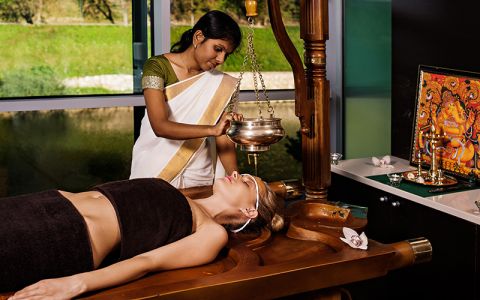
The meaning of Ayurveda
Sri Lanka and India both have a ministry of Ayurveda, with the aim of making this alternative form of health care accessible to everyone. At birth, the three doshas (Vata, Pitta and Kapha) are perfectly balanced. A physical complaint arises when one of those three doshas is out of balance. Dosha literally means 'deficiency', but the term also refers to a human type or life energy. Many people experience in their life a disturbance in the dosha type, due to unhealthy nutrition, stress or medical complaints. Ayurveda aims to bring your balance back.
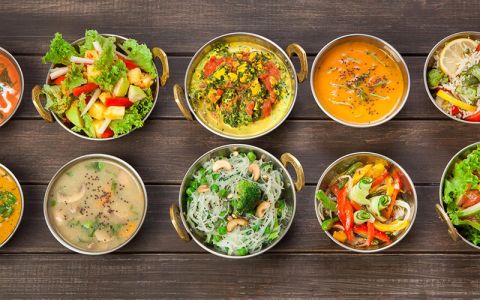
Ayurvedic meals and food
Ayurveda places great importance on nutrition and considers food as medicine. According to Ayurveda, a balanced diet plays a vital role in maintaining optimal health and well-being. Meals are made within the six tastes form the basis of Ayurvedic nutrition: sweet, sour, salty, pungent, bitter and astringent. Ayurvedic meals can be presented in two ways:
1. Buffet style (India and Sri Lanka. Each dish has has a note along indicating the ingredients and for which dosha type it is suitable for.
2. Daily menu or a la carte: the Ayurveda chef cook receives instructions from the Ayurvedic doctor and prepares a la carte meals. Most European ayurveda resorts serve fixed Ayurvedic menus. They are not personalized.
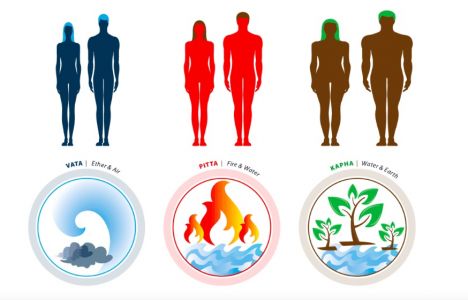
Ayurvedic Doshas
According to Ayurveda, each person has a unique combination of three fundamental energies or doshas known as Vata, Pitta and Kapha. These characteristics are expressed in physical characteristics, immune system and behavior. In order to regain physical balance, it is important to first find out which type you are, which dosha predominates in you. This is determined by an Ayurvedic doctor based on an extensive questionnaire, physical research and the complaints you may experience. Based on the results, the doctor will create a personalized treatment plan. Here's some information about each dosha type:
Ayurvedic Dosha type Vata: Impulsive and enthusiasm
Main elements: Vata is associated with the elements of air and space. The Vata dosha is responsible for the nervous system, breathing and movement of the body. People with a predominant Vata dosha tend to be creative, energetic and enthusiastic. They often have an active mind, quick thinking and a love for change and new experiences.
Physical Characteristics: slim posture, dry tight skin, fragile nails, irregular bowel movements, high-pitched voice, fast gait and movement, light sleeper.
Mental characteristics: full of enthusiasm, creative, cheerful, initiative, quick-witted, bright appearance, good short-term memory, moderate long-term memory.
Challenges: When imbalanced, Vata individuals may experience anxiety, restlessness and digestive issues. It is important for them to maintain a regular routine, practice grounding activities and nourish themselves with warm and nourishing foods.
Ayurvedic Dosha type Pitta: Fire
Main elements: Pitta is associated with the elements of fire and water. Pitta has to do with metabolism and digestion in the body.
Physical Characteristics: medium body frame with moderate muscle development, strong digestive system, robust appetite, warm body temperature, well-defined facial features (sharp, eyes, pointed nose and well-formed eyebrows), premature graying of hair or early hair thinning and balding due to the influence of Pitta's fiery nature) and a strong metabolic rate.
Mental characteristics: Individuals with a dominant Pitta dosha are usually driven, ambitious and focused. They have a strong digestion and a sharp intellect. Pitta types are often natural leaders, but excess Pitta can manifest as irritability and inflammatory conditions.
Challenges: Imbalances in Pitta can lead to tendencies for inflammation, heat-related conditions and increased sweating. When imbalanced, Pitta benefits from cooling practices, moderation in intensity and a diet that includes cooling foods and plenty of hydration.
Ayurvedic Dosha type Kapha: Structured
Important elements: Kapha is associated with the elements of earth and water. People with a predominant Kapha dosha are generally calm, nurturing and stable. They have a strong physical constitution and tend to be loving and compassionate.
Physical Characteristics: curvy, greasy hair, strong white teeth, big eyes, good digestion, slow movements, deep and peaceful sleep.
Mental characteristics: inner peace, good social skills, loving, generous, kind, thrifty. The Kapha type does not make decisions quickly, wakes up slowly, needs coffee often, respects other people's feelings, seeks emotional comfort through food and moves gracefully.
Challenges: An imbalance in Kapha can lead to lethargy, weight gain and attachment. Kapha individuals benefit from regular exercise, stimulation and a diet that includes warming and light foods.
9x Ayurveda Treatments and massages
There are different types of Ayurveda treatments. The best known and most intensive is the panchakarma. Panchakarma provides detoxification, relaxation, rejuvenation and vitalization. A panchakarma cure has a minimum stay of two weeks. For optimal results, a three or four week course is recommended. There is a lot of variety in programs: long, short or with various topics such as weightloss or stress reduction.
Typical Ayurveda treatments abhyanga - body massage. Abhyanga shareera - head massage, Nasya karma - nasal treatment. Pinda sweda - massage (with heated herbal pads). Shirodhara - warm oil poured on the forehead. Herbal bath and herbal steam bath
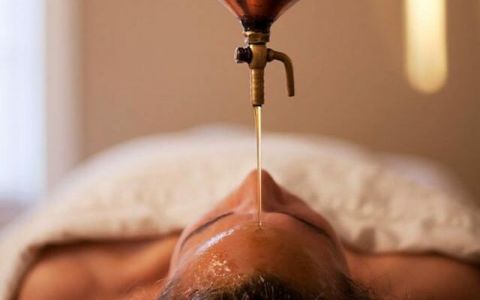
Shirodhara
Shirodhara is a traditional Ayurvedic therapy that involves a gentle pouring of warm oil or other liquids over the forehead in a continuous stream. The word "Shiro" means head, and "Dhara" means flow or stream. Shirodhara is a deeply relaxing and therapeutic treatment known for its ability to calm the mind, balance the doshas and promote overall well-being. The continuous flow of warm liquid over the forehead induces a state of deep relaxation, helping to release stress, tension and anxiety. Shirodhara has a calming effect on the nervous system, making it beneficial for those experiencing insomnia or sleep disturbances. It can help induce a state of relaxation and promote better sleep quality.
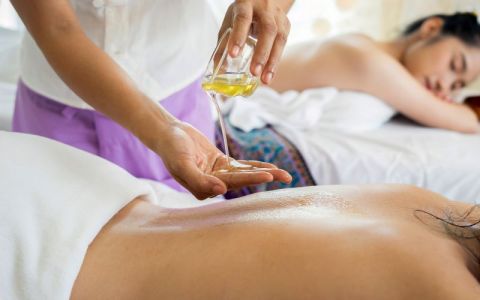
Abhyanga shareera body massage
The Ayurvedic doctor determines in the diagnosis which type of medicinal oil is suitable for you. The therapist applies the oil to your body with long, gentle arm movements. The massage relaxes the muscles and promotes blood circulation. The oil softens the skin, invigorates the tired body and strengthens the muscles.
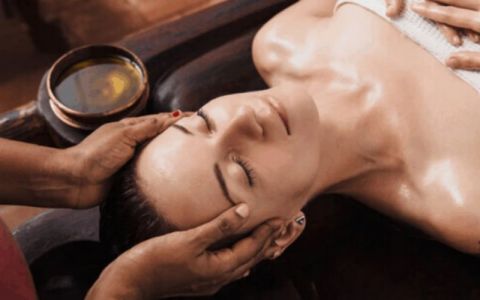
Abhyanga Shareera head massage
The therapist applies the oil to the head with massaging movements. The massage promotes blood circulation, is extremely relaxing and counteracts migraines and headaches. It also promotes hair growth so is good for hair loss, baldness and dandruff and is a great anti-stress treatment.
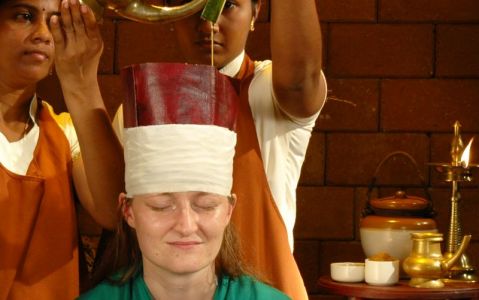
Shiro vasti
Shiro Vasti, also known as Shiro Basti, is a therapeutic Ayurvedic treatment that involves the application of medicated oil over the head and scalp. Shiro Vasti is a specialized treatment that targets the head and is primarily used to address various head and neck-related conditions. A cylindrical cap made of dough is placed on top of the head. The cap is secured firmly to create a sealed container. Warm, medicated herbal oil is poured into the cap, allowing it to remain on the head for a specific duration. The oil is kept at a warm temperature throughout the treatment.
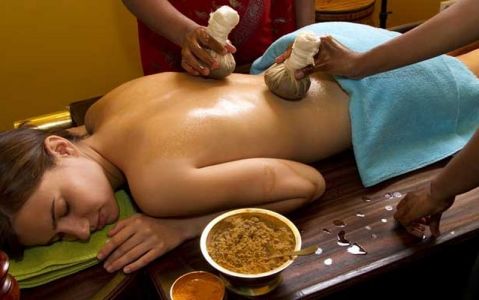
Peanut sweda massage
Peanut Sweda massage, also known as Shashtika Shali Pinda Sweda, is a traditional Ayurvedic therapy that involves the use of warm, cooked rice-based bundles infused with medicated oils and herbs. This massage technique is deeply relaxing and rejuvenating. The bundles are heated to a warm temperature and used to massage the body in rhythmic movements, applying gentle pressure. The massage strokes are performed by the therapist using the Peanut Sweda bundles, focusing on different areas of the body.
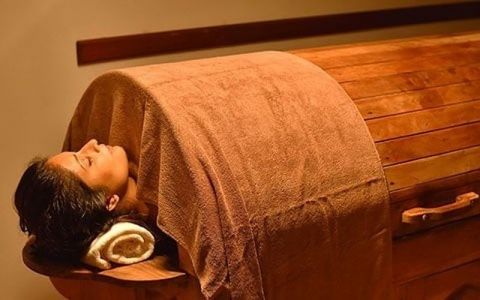
Herbal steam bath
A 'Svedana' treatment involves exposing the body to herbal steam to induce sweating and promote detoxification. A herbal steam bath is typically conducted in a specially designed steam box or chamber. The chamber is heated, and medicinal herbs are added to the steam generator or infused in water. Common herbs used in Ayurvedic steam baths include eucalyptus, neem, tulsi (holy basil), ginger, mint, and various aromatic herbs. Once the herbal infusion is ready, you will be seated or lie down inside the steam chamber. As the steam permeates your skin, it raises the body temperature, promoting sweating and opening the skin's pores. Sweating helps eliminate toxins, purify the body and enhance circulation.
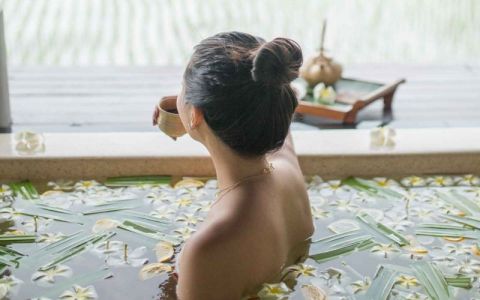
Herbal bath
In Ayurveda, an herbal bath is a therapeutic bathing practice that involves the use of herbal preparations to enhance the bathing experience and promote overall well-being. It is a way to incorporate the healing properties of herbs into your self-care routine. Here's an overview of an Ayurvedic herbal bath. To prepare an Ayurvedic herbal bath, you will need a selection of dried herbs, flowers, and botanicals. Common herbs used in Ayurvedic baths include lavender, chamomile, rose petals, neem, sandalwood, tulsi (holy basil), and other aromatic herbs. You can create your own herbal blend based on your desired benefits or use pre-packaged herbal bath blends available in stores.
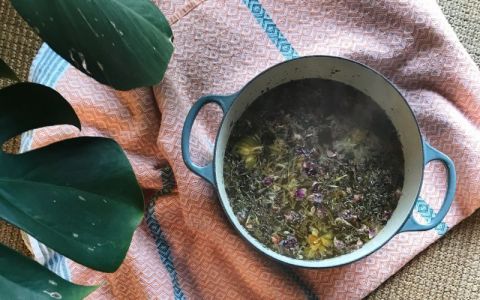
Herbal steam inhalor
A steam inhalator, also known as a steam inhaler or a facial steamer, is a device that generates warm, moist steam for inhalation. It is designed to deliver therapeutic steam directly to the respiratory system, providing relief for various respiratory conditions and promoting better breathing. A steam inhalator typically consists of a base unit or reservoir that holds water, a heating element and a mask or mouthpiece through which the steam is inhaled. The device uses electricity or battery power to heat the water, creating steam that is then directed to the user's face or mouth.
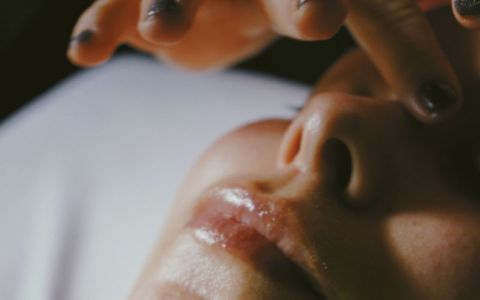
Facial treatment
An Ayurvedic facial treatment is a holistic approach to skincare that focuses on restoring balance and harmony to the skin. It incorporates natural ingredients, traditional Ayurvedic techniques and personalized recommendations based on an individual's unique mind-body constitution (dosha). Before the facial treatment, a qualified Ayurvedic practitioner or therapist will conduct a consultation to assess your skin type, identify any imbalances or specific concerns and determine your dosha (Vata, Pitta, or Kapha) or dosha combination. This helps in customizing the facial treatment to your specific needs.
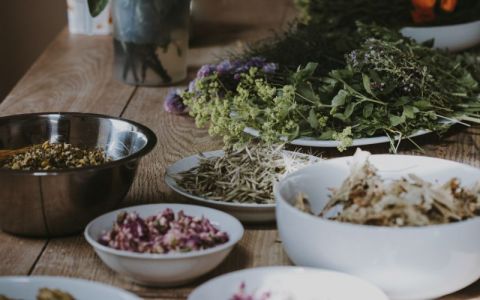
Herbal Ayurvedic Medicine
Ayurvedic medicines, according to an ancient recipe, containing more than forty dried fresh ingredients (plants, roots, flowers, etc.). An Ayurveda treatment can be supplemented by taking extra herbal supplements.
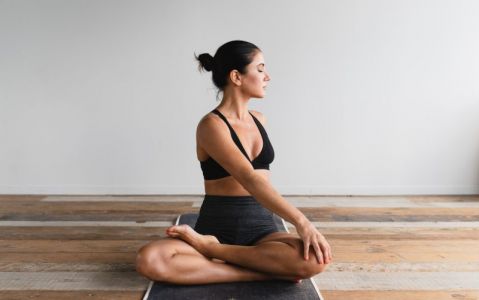
Yoga as powerful element to the Ayurvedic treatments
The yoga classes have a powerful added value to the Ayurvedic treatments. Yoga and Ayurveda originated from the same philosophy and are inextricably linked. Yoga has many variations, the best known are hatha yoga (focusing on your posture) and pranayama yoga (focusing on the breath). In addition to a healing effect, yoga brings peace, quiet and peace to body and mind.
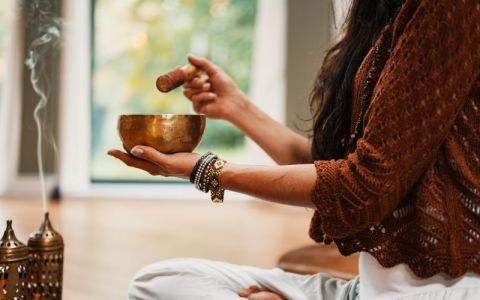
Meditation as mindful element to the Ayurvedic treatments
With meditation you can restore the natural balance of body and mind and increase self-awareness. There are several meditation variations.
- Meditation with a focus on breathing gives new spiritual insights and strengthens self-awareness.
- Meditation with a focus on compassion promotes compassion for yourself and for others. Participation in the meditation classes is voluntary.
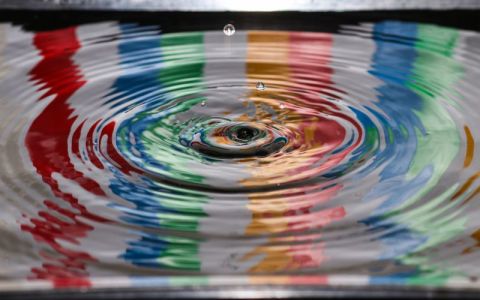
Effects on emotional and physical health
Some treatments can affect your emotional and physical health. The shirodhara treatment (pouring warm oil on your forehead for 30–45 minutes) is a very intensive treatment that can release emotional ballast from the past or extreme fatigue. Other people, on the contrary, become energetic and relaxed. Whatever the effects will be for you, surrender to it and don't shy away from your feelings and emotions. If you feel the need to talk to someone about it, you can always turn to the local doctor or therapist.
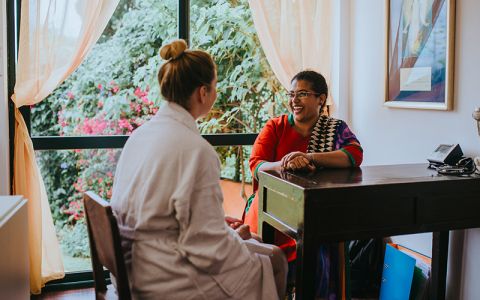
14x tips for your Ayurveda retreat
Below are a number of tips and nutritional advice so that you can also maintain the positive effects of an Ayurveda treatment at home. Remember that for a well-functioning digestive system, not only the quality of the food is important, but also how and when you eat. Change is best done step by step. Start with one or two points that are easy to apply and then expand. You can supplement these steps with yoga and meditation classes as you wish.
- Only eat when you are really hungry and only after the previous meal has been fully digested (3 to 5 hours after the main meal).
- Do not eat too much, a three-quarter full stomach is ideal.
- Eat in a calm and relaxed atmosphere. It is better not to read, work or watch television while eating.
- Always eat sitting down.
- Sit quietly for 5 to 10 minutes after meals.
- Always eat at about the same time.
- Don't eat too fast or too slow.
- Lunch is the main meal, breakfast and dinner are light meals.
- Do not snack when you are not hungry.
- Cook your food fresh and make sure it is tasty, digestible and hot.
- Do not use food that has been warmed up or is no longer fresh.
- Cook most of your food, your body absorbs cooked food better. Raw food (salad) serves as a side dish.
- It is better to omit milk with a meal. Milk combines well with toast, cereals and foods with a sweet taste.
- Do not heat honey or use it in cooking or frying.
- Don't eat heavy foods at night, such as meat, sausage, fish, yogurt, cheese, buttermilk, cottage cheese, or anything high in protein.
Discover our Ayurveda holidays
We divided our Ayurveda holidays in various subcategories, which we explain below.
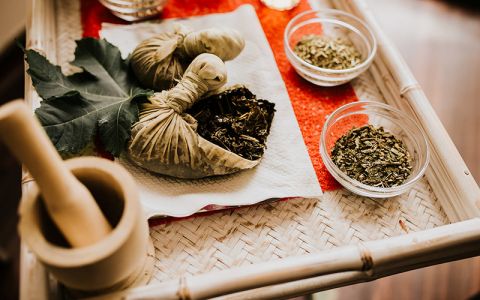
Panchakarma retreats
Panchakarma is a traditional Ayurvedic therapy that involves a series of cleansing and rejuvenating treatments for body and mind. The Ayurveda panchakarma treatments boost the body’s immune system. The word ‘Panchakarma’ comes from the Sanskrit language and means ‘five actions’ or ‘five treatments’. A panchakarma cleanses your body in five ways. These five ways will restore balance to the doshas (energies). The main aspects are oil massages, medicinal sweating and cleansing the frontal sinuses (eyes and mucous membranes of the nose). You are diagnosed by an Ayurvedic doctor to determine your dosha (energies) balance and identify any imbalances that need to be addressed. Panchakarma is a highly individualized treatment that is tailored to each person's unique constitution and health needs. It is usually conducted over a minimum of 2 weeks to several weeks and is typically performed under the guidance of an Ayurvedic doctor.

Ayurveda retreats in Europe
There are many great places around the world to go for an Ayurveda holiday, where you can experience authentic Ayurvedic treatments and therapies in a beautiful and peaceful environment. Ayurveda is becoming increasingly popular in western countries as people seek out more natural and holistic approaches to healthcare. Europe is home to a number of Ayurvedic clinics and health centers that offer authentic Ayurvedic treatments, a dosha-specific diet and daily yoga and meditation. You will find specialized Ayurveda hotels in Germany, Austria, Madeira, Spain, Slovenia etc in a serene and tranquil setting. The hotels source the knowledge, experience and products (and sometimes even the Ayurveda practitioners and therapists) from India or Sri Lanka. The Wellbeing Experts at Puurenkuur can advice you which Ayurveda resort suits your personal needs and goals. We have been in all the hotels and resorts we offer and can advice you in detail.
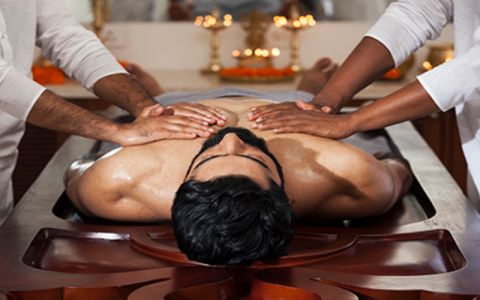
Short Ayurveda Boosters
In this selection we listed the Ayurveda hotels and resorts in Europe that offer short (introduction) Ayurveda programs to give you a taste of what this holistic approach can do for you. The Ayurveda programs are just a couple of nights, and include Ayurveda meals, treatments and yoga/meditation. Enjoy gentle treatments and experience deep relaxation. Ayurveda, a natural system of medicine, originated in India more than 3,000 years ago. Ayurveda can help to improve physical, mental and emotional health, and promote a sense of balance, harmony, and wellbeing. Ayurveda also achieves remarkable results for rheumatic conditions, sleep problems, chronic fatigue, stress, high blood pressure or skin diseases. There are so many reasons to treat yourself to an ayurveda holiday: to detoxify, for stress relief, to improve your overall health & wellbeing, or to re-energize/rebalance and revitalize. Ayurveda focusses on your body, mind and soul with gentle treatments and lots of personal attention.
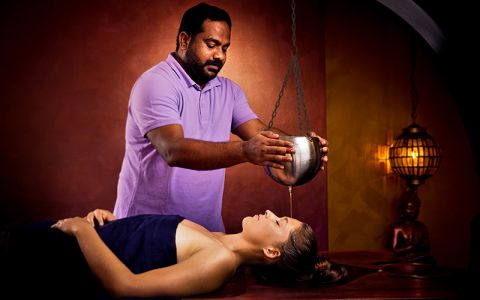
Authentic Ayurveda retreats in India, Sri Lanka and Nepal
Ayurveda is a traditional system of medicine that is rooted in India and is based on the principles of the Ayurvedic philosophy. It is a holistic approach to health and wellbeing. Sri Lanka, India and Nepal are the countries that traditionally represent the best places in the world to go to for an authentic Ayurveda holiday. India offers an incredible number of Ayurveda hotels, so does Sri Lanka. The resorts selected in this category offer authentic ayurveda programmes, practiced by trained and certified Ayurvedic doctors and therapists who have a deep understanding of the philosophy, principles, and techniques of this ancient healing system. Each guests will receive a personalized treatment plan which is tailored to your unique needs and health goals. In authentic Ayurveda is a natural and holistic approach, including specific Ayurveda food and meals, herbal remedies, massage, body treatments, yoga and meditation.
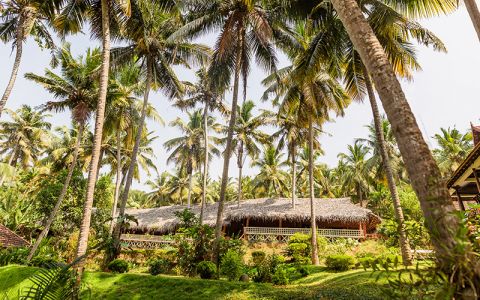
Luxury Ayurveda Holidays
A listing of our Top Luxury Ayurveda resorts. Every hotel in this category excels in luxury and comfort (minimal five star) and offers good quality of Ayurveda programs and treatments. Luxury Ayurveda refers to the application of Ayurvedic principles and practices being in a luxurious and high-end setting. In the context of luxury Ayurveda, the traditional Ayurvedic practices are often combined with modern spa treatments to offer a unique and indulgent experience. This may include services such as personalized Ayurvedic consultations, specialized massages, facials, and other body treatments, along with yoga and meditation classes, gourmet Ayurvedic cuisine, and access to luxurious facilities such as steam rooms, saunas, and pools. Luxury Ayurveda retreats and spas have become increasingly popular in recent years, as more people seek to incorporate holistic wellness practices into their lifestyles.
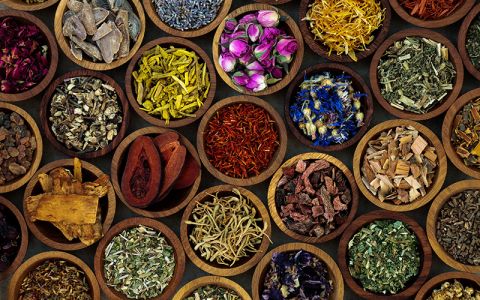
Ayurveda and Detox retreats
Ayurveda's emphasis on detoxification is part of its broader approach to healthcare, which seeks to address the root cause of health problems and promote overall balance and well-being. Ayurveda offers a range of detoxification techniques to eliminate these toxins, including diet modifications, herbal remedies, massage, yoga and meditation. These techniques are designed to support the body's natural detoxification processes and restore balance to the body. Ayurveda achieves remarkable results for detoxing, rheumatic conditions, sleep problems, chronic fatigue, stress, high blood pressure, migraines, psoriasis or depression. In Ayurveda, the concept of "ama" refers to toxins that accumulate in the body as a result of improper digestion, metabolism, and elimination. These toxins can lead to various health problems and disrupt the body's natural balance.
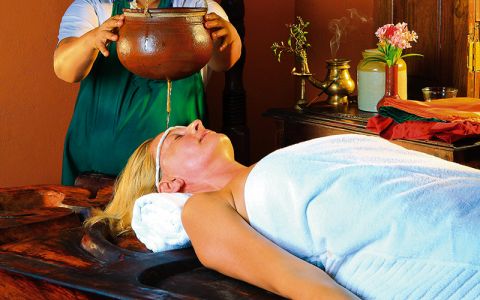
Ayurveda retreats in India
Ayurveda has its roots in India and has been practiced for thousands of years, making it an integral part of the country's culture and tradition. There are several reasons why Ayurveda in India is considered to be particularly good. Ayurveda has been practiced in India for thousands of years, and its knowledge has been passed down through generations of practitioners. This has resulted in a rich tradition of Ayurvedic knowledge and expertise that is unparalleled in other parts of the world. India is home to a diverse range of herbs and ingredients that are used in Ayurvedic treatments. Ayurveda is a popular and widely accepted form of healthcare in India, and as a result, it is affordable and accessible to many people. Ayurvedic treatments and remedies are often available in local communities, making it easy for people to access this form of healthcare.

Ayurveda retreats in Kerala
India offers an incredible number of Ayurveda hotels, especially in the south province, Kerala. This state is known for its rich heritage of Ayurvedic medicine and is considered to be one of the best places to experience Ayurveda treatments. Ayurveda in Kerala is deeply rooted in the state's culture and is widely practiced by both locals and tourists. Many Ayurvedic centers, clinics, and resorts are located throughout the state, offering a range of traditional Ayurvedic treatments, including Panchakarma therapies, massage, and herbal remedies. One of the unique features of Ayurveda in Kerala is the use of locally grown herbs, spices, and medicinal plants. Kerala's tropical climate and diverse landscape provide an ideal environment for growing a wide variety of herbs and plants that are used in Ayurvedic medicine. Kerala has many forested areas and a pleasant climate, with a refreshing monsoon season (June - November), which is a great period to do an ayurveda program.
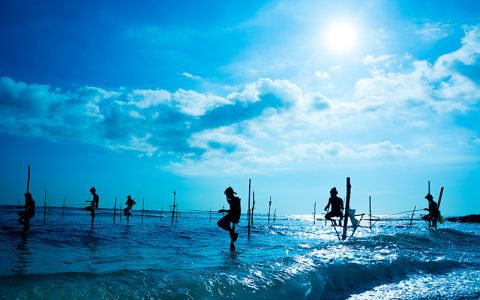
Ayurveda retreats in Sri Lanka
Sri Lanka is considered a great Ayurveda destination for several reasons. Ayurveda is an ancient system of medicine that originated in India thousands of years ago and was later adopted and developed in Sri Lanka. Sri Lanka's natural environment, which includes tropical forests, mountains, and beaches, provides the perfect setting for Ayurveda treatments that promote wellness and balance. Sri Lanka's natural environment is rich in medicinal plants, herbs, and minerals that are used in Ayurvedic treatments. The country's tropical climate, beaches, and mountains create a serene and peaceful environment that is conducive to healing and relaxation. Sri Lanka has - just as India - a long history of Ayurvedic medicine, and many practitioners have been practicing for generations. Ayurveda doctors and therapists in Sri Lanka have developed their own unique approaches to Ayurveda, which incorporate traditional practices and modern techniques.
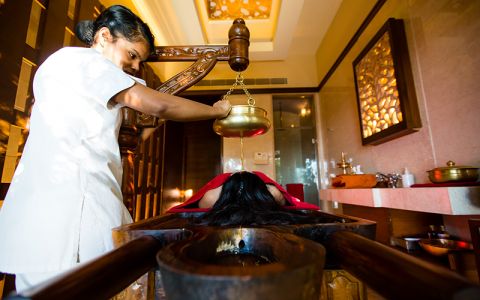
Spa's and retreats that offer just Ayurvedic treatments
Ayurveda treatments can include a wide range of non-food therapies and practices that are designed to promote health and well-being in a holistic and natural way. In this category Puurenkuur listed the hotels and retreats that offer quality Ayurveda treatments, without having the full package of ayurvedic meals, supplements or yoga. Ayurvedic treatments aim to restore balance to the body and promote health by using a combination of natural remedies, including herbs, spices and oils. The benefit of an Ayurveda treatment can be wide: It originates from an ancient Indian system of medicine, it is purely based on natural remedies, it is tailor-made and it has a holistic approach. Some typical Ayurvedic treatments are Abhyanga, Shirodhara, Basti, Nasya or Udvartana. We explain them all in the below section, by clicking the read more button.
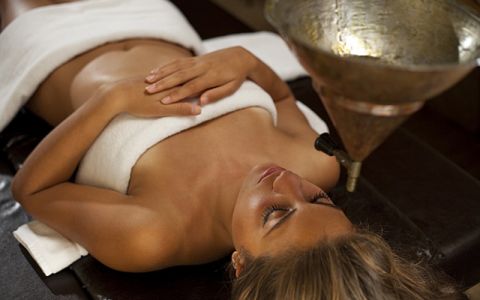
Bonus tips for your Ayurveda holiday
In authentic Ayurveda resorts (as found in India and Sri Lanka) there is no TV and no air conditioning. This has to do with the Ayurvedic philosophy to relax your mind. You have all the time to read! During an Ayurveda treatment, men are treated by a male therapist and women by a female therapist. However, sometimes this does not work, because only one therapist works in small-scale Ayurveda hotels. In addition, due to the power of the massage, some guests prefer a therapist of the opposite sex. It is important that you always indicate what you like. You can also report this if you don't click with a therapist. During a massage you will receive disposable slips, sometimes you will be asked to undress completely. The herbal oil from the Ayurveda treatments can get into your clothes. So take some old clothes with you.
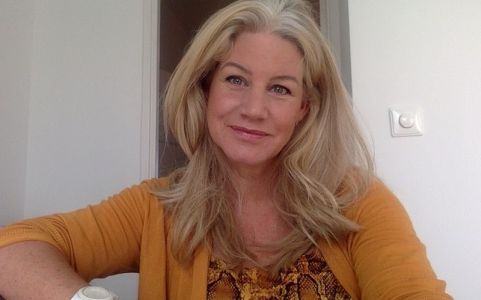
Marleen
This blog is written by Marleen, the founder of PureandCure.com. She travels around the world in search of the best Health & Wellbeing Hotels, Spas and Retreats and shares her know-how, experiences and observations through her blogs.

 EN
EN NL
NL BE
BE